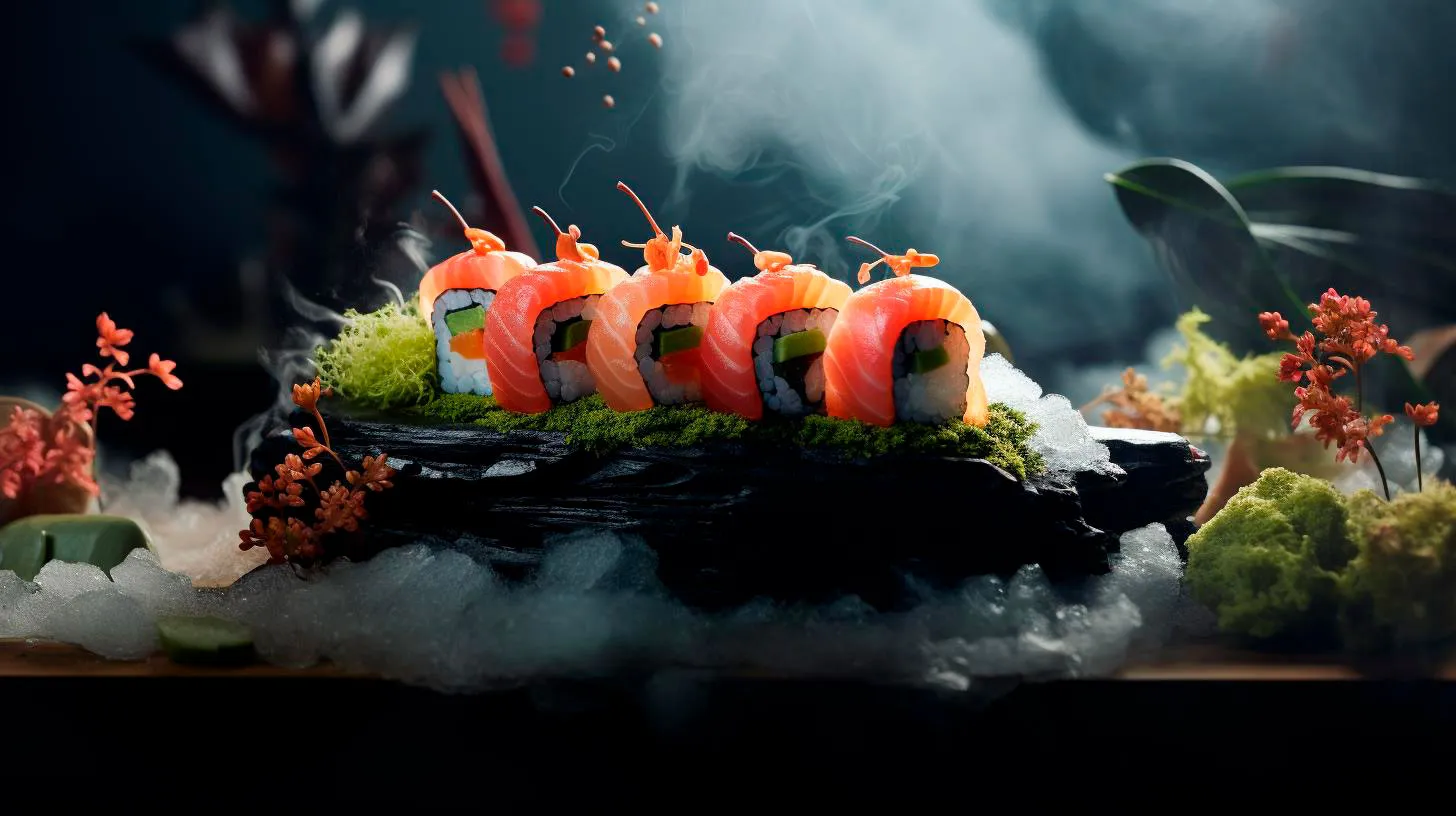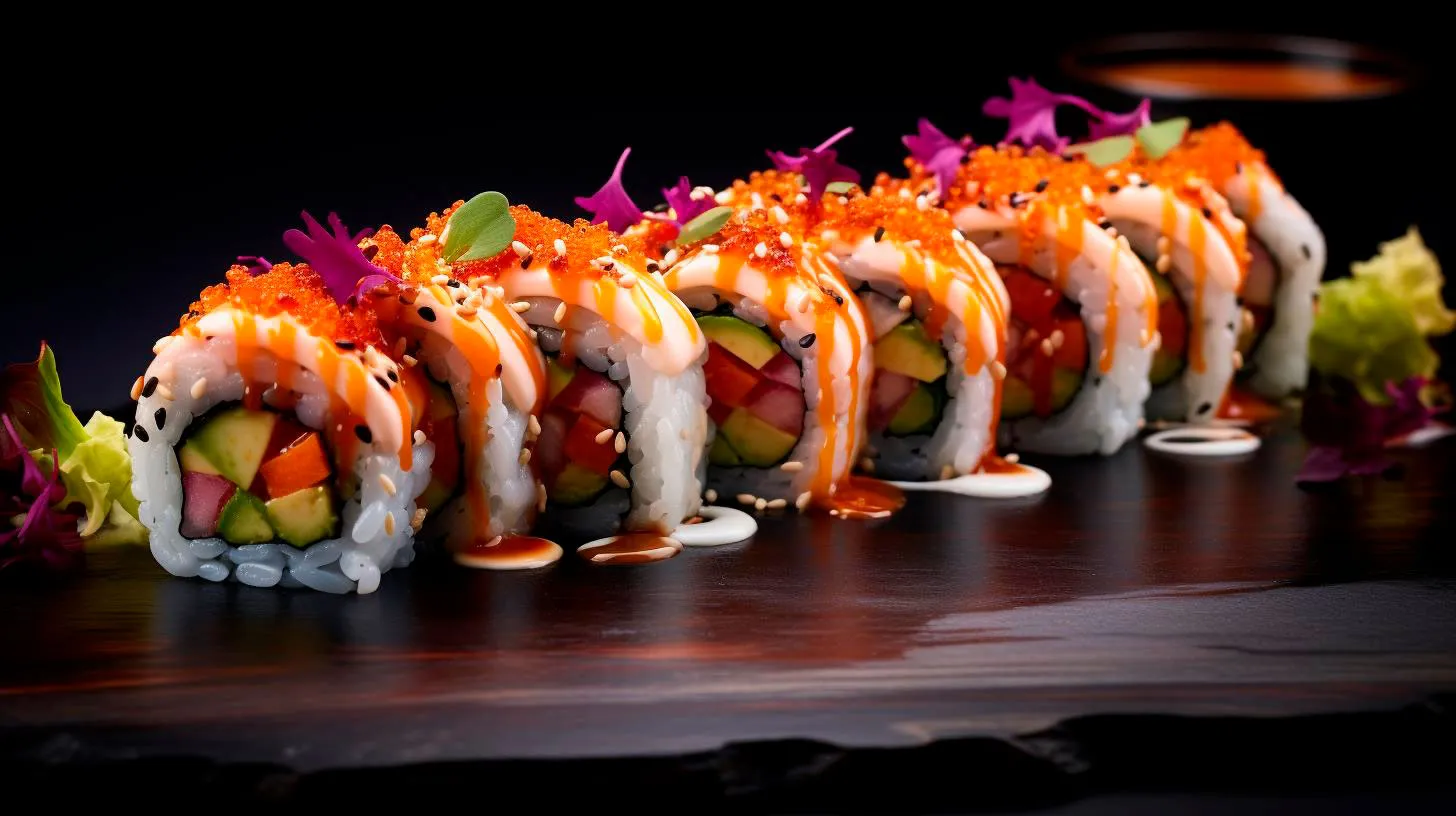Sustainable Sushi Bold Innovations for Ocean Conservation
In this article, we will explore some of these innovative practices and the advantages they offer in terms of sustainability and marine biodiversity.
The Rising Popularity of Sustainable Sushi
Sushi has gained immense popularity in recent decades, becoming a staple in many countries worldwide. However, the high demand for sushi ingredients, particularly seafood, has posed a significant threat to the ocean’s delicate ecosystem. Unsustainable fishing practices, overfishing, and habitat destruction have put several marine species at risk of extinction.
- Consumers Demand Sustainable Choices: With growing environmental consciousness, consumers are increasingly seeking sustainable options in all areas of their lives, including dining choices. Sushi lovers are eager to support restaurants and suppliers that prioritize sustainable sourcing.
- Restaurants and Suppliers Respond: To meet the demand for sustainable sushi, many restaurants and suppliers have implemented responsible sourcing practices. This includes adopting fishing techniques that minimize bycatch, using farmed seafood that promotes biodiversity, and supporting local fisherman who use sustainable methods.
Technological Innovations in Sustainable Sushi
The sushi industry has embraced technological advancements to create a more sustainable future. These innovations not only reduce the environmental impact but also enhance efficiency and traceability in the supply chain, ensuring consumers can make informed decisions about their sushi choices.
1. Alternative Protein Sources
One of the most significant challenges in sustainable sushi is reducing dependence on overfished species like bluefin tuna. To address this, companies have turned to alternative protein sources like plant-based and lab-grown options.
Key Takeaway:
- Plant-based and lab-grown protein sources offer a sustainable alternative to traditional seafood options.
- These alternatives reduce the strain on wild populations and offer opportunities for responsible and ethical dining.
2. Blockchain Technology for Traceability
Ensuring the integrity of the seafood supply chain is crucial for sustainability. Blockchain technology provides a transparent and immutable record, allowing consumers to trace the journey of their sushi from ocean to plate.
Key Takeaway:
- Blockchain technology enhances transparency and allows consumers to make informed choices about their seafood consumption.
- It enables restaurants and suppliers to showcase their sustainable practices, building trust with environmentally conscious diners.
3. Eco-friendly Packaging
Sustainable sushi goes beyond responsible sourcing; it also considers the environmental impact of packaging. Many sushi establishments now opt for eco-friendly packaging materials, such as biodegradable or compostable containers.
Key Takeaway:
- Eco-friendly packaging reduces waste and minimizes the carbon footprint associated with sushi consumption.
- Restaurants that prioritize eco-friendly packaging demonstrate their commitment to sustainable practices and attract environmentally conscious customers.
The Advantages of Sustainable Sushi
Adopting sustainable sushi practices offers numerous advantages, both for the oceans and the sushi industry itself.
1. Marine Biodiversity Preservation
By promoting responsible fishing practices and reducing the demand for endangered species, sustainable sushi helps preserve marine biodiversity. This, in turn, maintains a healthy and balanced ecosystem.
2. Long-term Economic Viability
Unsustainable fishing practices jeopardize the long-term economic viability of the sushi industry. By embracing sustainable practices, the industry ensures a stable supply of seafood for future generations, protecting the livelihoods of fishers and maintaining a thriving market.
3. Consumer Trust and Loyalty
Consumers appreciate businesses that prioritize environmental sustainability. Restaurants and suppliers that offer sustainable sushi options build trust and loyalty among environmentally conscious diners. This can lead to repeat business and positive word-of-mouth recommendations.
Conclusion
Sustainable sushi represents a major leap forward in ocean conservation. The adoption of bold innovations, such as alternative protein sources, blockchain technology for traceability, and eco-friendly packaging, ensures a brighter and more sustainable future for both the oceans and the sushi industry. By making conscious choices and supporting establishments that prioritize sustainability, we can all contribute to the preservation of our precious marine ecosystems.
Saving Coral Reefs: Sushi Industry Lending a Helping Hand
The Plight of Coral Reefs
Coral reefs are not only mesmerizing ecosystems but also crucial for marine biodiversity. Sadly, they are facing numerous threats that put their existence at risk. Factors such as climate change, pollution, overfishing, and destructive fishing practices have led to widespread coral bleaching and degradation. According to the World Wildlife Fund (WWF), approximately 27% of coral reefs have already been lost, and an additional 32% are at risk of being lost within the next 32 years.
The Sushi Industry’s Unique Position
The sushi industry, with its heavy reliance on sustainable seafood, has the potential to become an ally in coral reef conservation. By promoting sustainable fishing practices, sourcing seafood responsibly, and educating consumers, it can help protect coral reefs from further deterioration. Here are some key ways in which the sushi industry is making a difference:
- Sourcing from sustainable fisheries: Sushi restaurants are increasingly embracing sustainable sourcing practices by partnering with suppliers committed to responsible fishing. This ensures that fish used for sushi are harvested in a way that minimizes negative impacts on coral reefs and their associated ecosystems.
- Supporting marine protected areas: Some sushi restaurants actively contribute to the establishment and management of marine protected areas (MPAs) where coral reefs can thrive. By working alongside conservation organizations and local communities, they help create zones where fishing and other harmful activities are restricted, allowing damaged reefs to recover.
- Raising consumer awareness: Sushi chefs and restaurant owners have a unique opportunity to educate their customers about the importance of sustainable seafood choices and the significant role coral reefs play in ocean health. By showcasing sustainably sourced options and providing information on the origin of their ingredients, they can empower consumers to make informed decisions.
The Impact and Benefits
The efforts made by the sushi industry to contribute to coral reef conservation bring several advantages:
- Preserving biodiversity: Coral reefs are home to an incredible diversity of marine life, supporting approximately 25% of all marine species. By protecting coral reefs, the sushi industry helps safeguard the delicate balance of ecosystems and ensures the long-term survival of numerous species.
- Securing the future of sushi: Sushi’s popularity relies heavily on a sustainable supply of seafood. By safeguarding coral reefs and promoting responsible fishing practices, the industry ensures the availability of high-quality fish for future generations, guaranteeing the vitality of the sushi culture.
- Enhancing sustainability practices: As the sushi industry takes a stand for coral reef conservation, it sets an example for other sectors in the food industry to prioritize sustainability. This can lead to a paradigm shift where sustainable practices become the norm rather than the exception, benefiting the entire seafood industry and the oceans as a whole.
Conclusion
The sushi industry’s commitment to sustainable seafood sourcing and coral reef conservation is commendable. By partnering with responsible suppliers, supporting marine protected areas, and raising consumer awareness, the industry is making a tangible difference in the fight to save coral reefs. It is crucial for more players in the food industry to follow suit and contribute to the preservation of these vital ecosystems. Together, with continued efforts and awareness, we can ensure that future generations can continue to enjoy not only the delicacy of sushi but also the incredible beauty and biodiversity of our coral reefs.
Key Takeaways:
- The sushi industry is actively involved in coral reef conservation by sourcing from sustainable fisheries.
- Sushi restaurants support the establishment of marine protected areas to allow damaged reefs to recover.
- Raising consumer awareness about sustainable choices helps protect coral reefs.
- Preserving coral reefs preserves marine biodiversity and secures the future of sushi.
- The sushi industry’s sustainability practices set an example for other sectors in the food industry.
Fisheries and Coral Reefs: A Balanced Approach for Sustainable Sushi
In this article, we will explore the importance of a balanced approach in fisheries management and how it can contribute to the preservation of coral reefs.
The Connection Between Fisheries and Coral Reefs
Coral reefs are often referred to as the “rainforests of the sea” due to their incredible biodiversity and the vital ecosystem services they provide. These underwater structures support a vast array of marine life, including fish species that are commonly sought after for sushi. However, when fisheries are poorly managed, they can have devastating effects on coral reefs, posing a threat to their long-term survival.
Overfishing, destructive fishing practices, and the use of harmful fishing gear can all lead to the destruction of coral reefs. For instance, certain fishing methods, such as bottom trawling, can cause physical damage to the fragile coral structures. Additionally, the depletion of fish populations can disrupt the delicate balance within the reef ecosystem, harming both the coral and the other organisms that rely on it for survival.
Recognizing the crucial relationship between fisheries and coral reefs, a balanced approach to fisheries management becomes essential. By implementing sustainable practices, we can help protect these valuable ecosystems while still enjoying our favorite sushi delicacies.
The Importance of Sustainable Fisheries
Sustainable fisheries management aims to ensure that fish populations are harvested at a rate that allows them to replenish, thereby maintaining healthy ecosystems and preserving biodiversity. It involves the use of responsible fishing practices, such as selective fishing gears, regulated catch limits, and protected areas. By prioritizing sustainability, both marine life and the fishing industry can thrive in harmony.
Advantages of sustainable fisheries:
- Preservation of fish stocks for future generations
- Mitigation of overfishing and its negative environmental impacts
- Promotion of biodiversity within coral reef ecosystems
- Strengthening of the fishing industry’s long-term economic viability
- Enhancement of consumer confidence in sustainably sourced seafood
Key takeaways:
- Sustainable fishing practices are crucial to preserve the delicate balance of coral reef ecosystems.
- Responsible fisheries management promotes long-term economic sustainability for the fishing industry.
- Choosing sustainably sourced seafood helps maintain healthy fish populations and marine biodiversity.
- Consumer demand for sustainable seafood can drive positive change within the fishing industry.
The Role of Certification Programs
In recent years, various certification programs have emerged to assist consumers in making sustainable seafood choices. One notable example is the Marine Stewardship Council (MSC), an independent organization that sets standards for sustainable fishing and seafood traceability. Products bearing the MSC label have undergone rigorous assessment and meet specific criteria for sustainability.
Certification programs like MSC provide consumers with a reliable way to identify sustainably sourced seafood, including fish used for sushi. By choosing certified products, individuals can support fisheries that prioritize responsible practices, thereby contributing to the protection of coral reefs and the overall health of our oceans.
Conclusion
When enjoying sushi, let us not forget the delicate relationship between fisheries and coral reefs. By embracing sustainable fishing practices and supporting certification programs, we can ensure the longevity of both the fishing industry and these remarkable underwater ecosystems. Together, we can savor our sushi guilt-free, knowing that we are making a positive impact on our planet.
From Plate to Reef: How Sushi Lovers Can Support Coral Conservation
By making conscious choices and supporting sustainable practices, we can ensure a healthier future for our oceans and protect the exquisite beauty of coral reefs.
The Threat to Coral Reefs
Coral reefs are not just visually captivating; they are also essential ecosystems supporting an incredible diversity of marine life. Unfortunately, these delicate habitats are under severe threat due to factors like climate change, pollution, and overfishing. With an estimated 50% decline in coral cover over the past few decades, urgent action is necessary to keep them from disappearing altogether.
Sustainable Sushi Choices
Contrary to popular belief, not all sushi is created equal when it comes to environmental impact. Let’s take a look at some sustainable choices you can make as a sushi lover:
- Opt for responsibly sourced fish: Choose sushi restaurants that prioritize sustainably caught or farmed seafood. Look for certifications such as the Marine Stewardship Council (MSC) for wild-caught fish and Aquaculture Stewardship Council (ASC) for farmed fish.
- Focus on low-impact species: Some fish species are more resilient and less vulnerable to overfishing. Opt for sushi made from sustainable options like mackerel, albacore tuna, or farmed shrimp, and avoid fish listed as endangered or threatened.
- Support local and seasonal ingredients: Choosing sushi with locally sourced and seasonal ingredients reduces the carbon footprint associated with transportation and supports local fishing communities.
The Role of Sustainable Packaging
Reducing sushi-related waste is another crucial aspect of supporting coral conservation. Consider the following tips:
- BYO reusable chopsticks: Disposable chopsticks contribute to deforestation and waste. Carry your own reusable chopsticks to reduce single-use plastic consumption.
- Minimize single-use packaging: Opt for sushi joints that use sustainable packaging options like biodegradable or compostable containers.
- Choose dine-in over takeout: Dine-in experiences typically generate less packaging waste compared to takeout orders. Whenever possible, enjoy your sushi in the restaurant.
The Connection Between Sushi Lovers and Coral Conservation
By making sustainable choices, sushi lovers become a part of the solution rather than the problem. Here are a few key takeaways:
- Preserve marine ecosystems: Sustainable sushi choices help protect the fragile balance of coral reefs, ensuring the survival of countless marine species.
- Support sustainable fishing practices: Choosing sustainably caught or farmed seafood encourages responsible fishing practices, reducing overfishing and bycatch.
- Combat climate change: Coral reefs act as carbon sinks, absorbing the greenhouse gases contributing to climate change. By supporting coral conservation, we indirectly help combat this global problem.
Coral reefs are remarkable natural wonders, and every effort matters when it comes to their preservation. As sushi lovers, we have the power to make a positive impact by selecting sustainable options and supporting responsible sushi businesses that value coral conservation. Together, let’s ensure that the beauty of coral reefs continues to thrive for generations to come.



